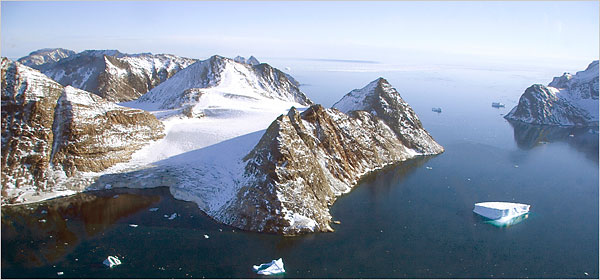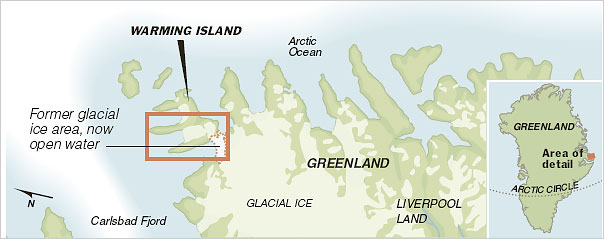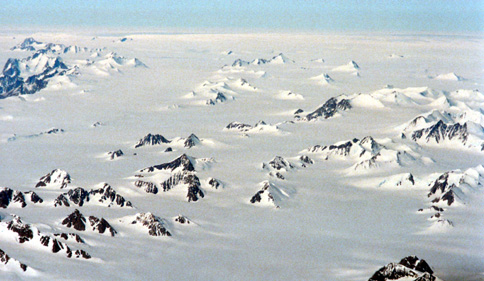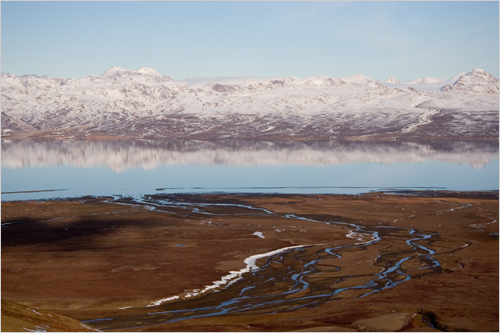To eavesdrop on breaking glaciers from within
The New York Times reports on "a newly revealed island 400 miles north of the Arctic Circle in eastern Greenland."
 [Image: Jeff Shea/New York Times].
[Image: Jeff Shea/New York Times].
"Despite its remote location," the Times explains, "the island would almost certainly have been discovered, named and mapped almost a century ago when explorers like Jean-Baptiste Charcot and Philippe, Duke of Orléans, charted these coastlines" – except that, until recently, the island was "bound to the coast by glacial ice."
In other words, climate change – melting ice and rising sea levels – has turned a peninsula into an island.
 [Image: Map of Greenland, courtesy of the New York Times].
[Image: Map of Greenland, courtesy of the New York Times].
"With 27,555 miles of coastline and thousands of fjords, inlets, bays and straits," we read, "Greenland has always been hard to map. Now its geography is becoming obsolete almost as soon as new maps are created." I'm tempted to say that that last sentence should be reversed, however: that the maps are becoming obsolete as soon as new geography is created.
For instance, there are the nunataks – or lonely mountains, in Inuit – which stick out from beneath the matrix of glacial ice. These features are now "being freed of their age-old bonds, exposing a new chain of islands, and a new opportunity for Arctic explorers to write their names on the landscape."
 [Image: The mountains of eastern Greenland: a future archipelago. Via Wikipedia].
[Image: The mountains of eastern Greenland: a future archipelago. Via Wikipedia].
From the New York Times:
Meanwhile, as Arctic temperatures continue to rise, and as the Greenlandic ice cap continues to liquefy, we'll see more and more spectacular – if catastrophic – shifts in global geography. (Whole new continents!)
And this won't be limited to the Arctic: "Over the long term," we read, "much larger sea-level rises would render the world’s coastlines unrecognizable, creating a whole new series of islands."
 [Image: Greenland's thawing landscape; photo by Jeff Shea/New York Times].
[Image: Greenland's thawing landscape; photo by Jeff Shea/New York Times].
In any case, I was fascinated to learn that "summertime 'glacial earthquakes' have been detected within the ice sheet" of Greenland. I can hardly imagine such a strange and haunting sound – like bells shattering – of pure ice heaving beneath your feet, as mile after mile of blue caves and tunnels shift their chambers to realign.
Is it possible, then, to drill contact microphones into the surface of Greenland and listen to this terrestrial baritone, the earth a reverberatory, to eavesdrop on breaking glaciers from within?
(With the use of the word "reverberatory" indebted to John Coulthart. Earlier on BLDGBLOG: Nova Arctica and When landscapes sing: or, London Instrument).
 [Image: Jeff Shea/New York Times].
[Image: Jeff Shea/New York Times]."Despite its remote location," the Times explains, "the island would almost certainly have been discovered, named and mapped almost a century ago when explorers like Jean-Baptiste Charcot and Philippe, Duke of Orléans, charted these coastlines" – except that, until recently, the island was "bound to the coast by glacial ice."
In other words, climate change – melting ice and rising sea levels – has turned a peninsula into an island.
 [Image: Map of Greenland, courtesy of the New York Times].
[Image: Map of Greenland, courtesy of the New York Times]."With 27,555 miles of coastline and thousands of fjords, inlets, bays and straits," we read, "Greenland has always been hard to map. Now its geography is becoming obsolete almost as soon as new maps are created." I'm tempted to say that that last sentence should be reversed, however: that the maps are becoming obsolete as soon as new geography is created.
For instance, there are the nunataks – or lonely mountains, in Inuit – which stick out from beneath the matrix of glacial ice. These features are now "being freed of their age-old bonds, exposing a new chain of islands, and a new opportunity for Arctic explorers to write their names on the landscape."
 [Image: The mountains of eastern Greenland: a future archipelago. Via Wikipedia].
[Image: The mountains of eastern Greenland: a future archipelago. Via Wikipedia].From the New York Times:
- "We are already in a new era of geography," said the Arctic explorer Will Steger. "This phenomenon – of an island all of a sudden appearing out of nowhere and the ice melting around it – is a real common phenomenon now." In August, Mr. Steger discovered his own new island off the coast of the Norwegian island of Svalbard, high in the polar basin. Glaciers that had surrounded it when his ship passed through only two years earlier were gone this year, leaving only a small island alone in the open ocean.
Meanwhile, as Arctic temperatures continue to rise, and as the Greenlandic ice cap continues to liquefy, we'll see more and more spectacular – if catastrophic – shifts in global geography. (Whole new continents!)
And this won't be limited to the Arctic: "Over the long term," we read, "much larger sea-level rises would render the world’s coastlines unrecognizable, creating a whole new series of islands."
 [Image: Greenland's thawing landscape; photo by Jeff Shea/New York Times].
[Image: Greenland's thawing landscape; photo by Jeff Shea/New York Times].In any case, I was fascinated to learn that "summertime 'glacial earthquakes' have been detected within the ice sheet" of Greenland. I can hardly imagine such a strange and haunting sound – like bells shattering – of pure ice heaving beneath your feet, as mile after mile of blue caves and tunnels shift their chambers to realign.
Is it possible, then, to drill contact microphones into the surface of Greenland and listen to this terrestrial baritone, the earth a reverberatory, to eavesdrop on breaking glaciers from within?
(With the use of the word "reverberatory" indebted to John Coulthart. Earlier on BLDGBLOG: Nova Arctica and When landscapes sing: or, London Instrument).





Comments are moderated.
If it's not spam, it will appear here shortly!
Heh, my pleasure Geoff.
As far as the sound of Greenland's eerie spaces goes, I would have thought Thomas Köner had already supplied an ideal soundtrack with his first recording, Nunatak Gongamur, from 1990. Köner makes whole CDs of rumblings and reverberations. His intention to evoke chilly wastes and cosmic voids is something he achieves with considerable success.
Could this be a golden opportunity for one of those land-less conceptual micro-nations? Freedonia? Roll the Kugel Mugel over?
Probably not... doesn't Denmark already own it?
of course we can record the seismic noise of glaciers. in fact, here's a link:
http://www.newscientist.com/article.ns?id=dn8374
Global warming is real, however, there is no need to bend the facts to illustrate it. The "new" island was not created by rising sea levels, but rather revealed by melting ice. This is no less alarming.
Post a Comment